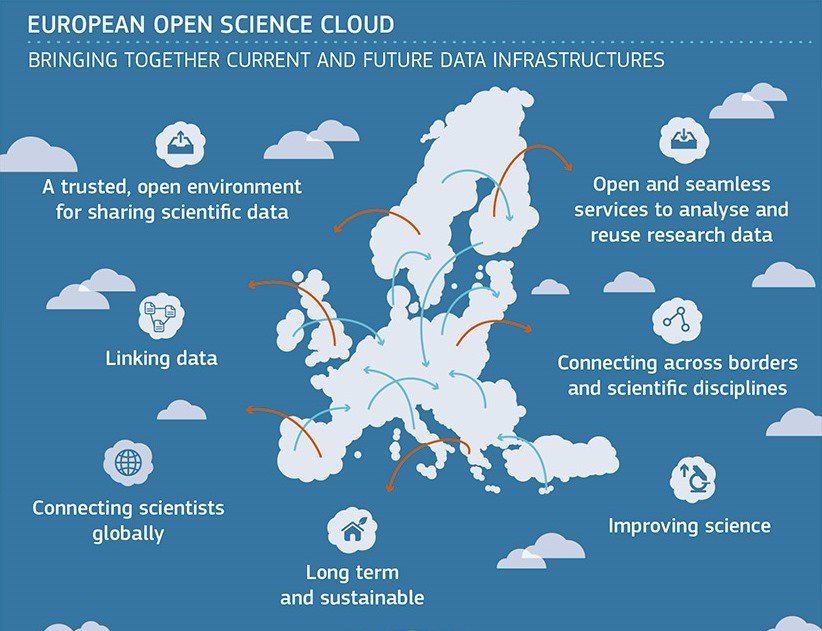EOSC-hub: Integrating and managing services for the European Open Science Cloud
The task of the EOSC-hub project is to create the integration and management system of the future European Open Science Cloud This hub will deliver a catalogue of services, software and data from the EGI Federation, EUDAT CDI, INDIGO-DataCloud and major research e-infrastructures worldwide. This integration and management system (the Hub) builds on mature processes, policies and tools from the leading European federated e-Infrastructures to cover the whole life-cycle of services, from planning to delivery.
The Hub aggregates services from local, regional and national e-Infrastructures in Europe, Africa, Asia, Canada and South America. The Hub acts as a single contact point for researchers and innovators to discover, access, use and reuse a broad spectrum of resources for advanced data-driven research. Through the virtual access mechanism, more scientific communities and users have access to services supporting their scientific discovery and collaboration across disciplinary and geographical boundaries.
The project also improves skills and knowledge among researchers and service operators by delivering specialised trainings and by establishing competence centres to co-create solutions with the users. In the area of engagement with the private sector, the project creates a Joint Digital Innovation Hub that stimulates an ecosystem of industry/SMEs, service providers and researchers to support business pilots, market take-up and commercial boost strategies.
EOSC-hub builds on existing technology already at TECHNOLOGY READINESS LEVEL (TRL) 8 and addresses the need for interoperability by promoting the adoption of open standards and protocols. By mobilizing e-Infrastructures comprising more than 300 data centres worldwide and 18 pan-European infrastructures, this project is a ground-breaking milestone for the implementation of the European Open Science Cloud.
GEOFON will be responsible for the tasks related to the Authentication and Authorization (AAI) system, as well as the Federated Data Life Cycle. In the case of AII, this extends from the initial collection of requirements, to definition of attributes roles and rules, to design and prototype development and finally to validation and assessment
In the case of the Federated Data Life Cycle, we will work on the design of automatic workflows for seismological data centres, including replication, persistent identifiers (PID) creation, and improvements in the data distribution.
In a final stage, when services are already in production, we will focus on the training activities (e.g.: seminars, workshops) to foster the adoption of the services beyond seismology.

Time frame
- 2018 - 2020
Principal Investigator
- J. Quinteros (GFZ Potsdam)
- Y. Legre (EGI)
Personnel
- J. Quinteros (GFZ Potsdam)
- A. Strollo (GFZ Potsdam)
Partner
- 74 European Institutions
Research Unit(s) and/or User Facilities
- MESI
Publication
- Strollo, A., Hanka, W., Saul, J., Heinloo, A., Hemmleb, S., Evans, P. L., Quinteros, J., Zieke, T., Jaeckel, K-H., Tilmann, F. (2017), the GEOFON Program, Journal of Large-Scale Research Facilities (to be submitted).
- Evans, P. L., A. Strollo, A. Clark, T. Ahern, R. Newman, J. F. Clinton, H. Pedersen, and C. Pequegnat (2015), Why seismic networks need digital object identifiers, Eos, 96, doi:10.1029/2015EO036971.
- Hanka, W., Saul, J., Weber, B., Becker, J., Harjadi, P., Fauzi, and GITEWS Seismology Group: Real-time earthquake monitoring for tsunami warning in the Indian Ocean and beyond, Nat. Hazards Earth Syst. Sci., 10, 2611-2622, doi:10.5194/nhess-10-2611-2010, 2010.



